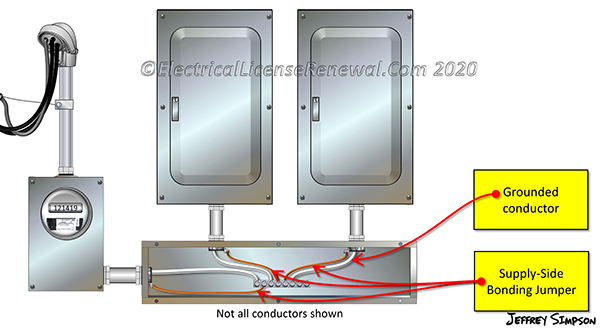Article 100 Bonding Jumper, Supply-Side.

Code Change Summary: Relocated code definition.
In the 2020 NEC®, the definition of a supply-side bonding jumper (SSBJ) was relocated from Article 250 to Article 100 to comply with the NEC® Style Manual. Prior to the 2020 NEC®, the term was used in Articles 230, 250, 310, 408, 450, and 694 but only defined in Article 250.
There was no change to the original definition. A SSBJ is a conductor installed on the supply side of a service or within service equipment enclosures, or for a separately derived system, that ensures the required electrical conductivity between metal parts required to be electrically connected. Unfortunately, the definition does not describe what can be used as a SSBJ.
The only code language providing any possible clarity on what constitutes a SSBJ is the following text from 250.32(A)(2) below, which only pertains to a SSBJ used in a separately derived system: “The supply-side bonding jumper shall be permitted to be of nonflexible metal raceway type or of the wire or bus type”.
250.30(A)(2) Supply-Side Bonding Jumper.
If the source of a separately derived system and the first disconnecting means are located in separate enclosures, a supply-side bonding jumper shall be installed with the circuit conductors from the source enclosure to the first disconnecting means enclosure. A supply-side bonding jumper shall not be required to be larger than the derived ungrounded conductors. The supply-side bonding jumper shall be permitted to be of nonflexible metal raceway type or of the wire or bus type as follows:
(1) A supply-side bonding jumper of the wire type shall comply with 250.102(C), based on the size of the derived ungrounded conductors.
(2) A supply-side bonding jumper of the bus type shall have a cross-sectional area not smaller than a supply-side bonding jumper of the wire type as determined in 250.102(C).
Below is a preview of the NEC®. See the actual NEC® text at NFPA.ORG for the complete code section. Once there, click on their link to free access to the 2020 NEC® edition of NFPA 70.
2017 Code Language:
Article 100.
This code definition was defined only in Article 250 and did not exist in Article 100.
2020 Code Language:
Article 100.
N Bonding Jumper, Supply-Side. A conductor installed on the supply side of a service or within a service equipment enclosure(s), or for a separately derived system, that ensures the required electrical conductivity between metal parts required to be electrically connected.